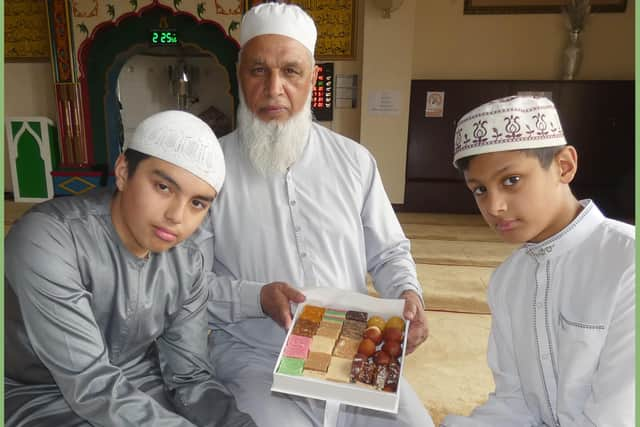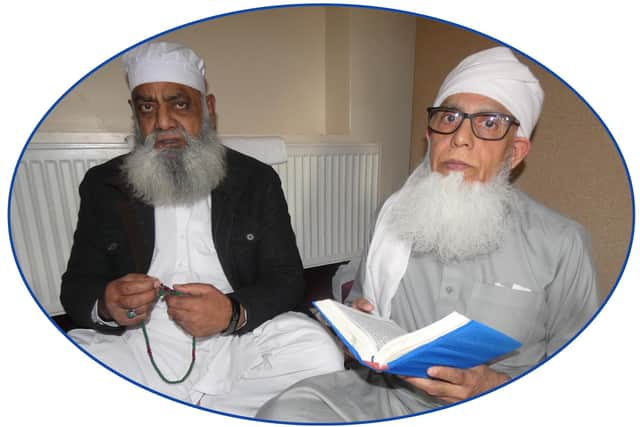Muslim faith communities across Dewsbury, Batley and Spen gather to celebrate the festival of Eid-Ul-Fitr
and live on Freeview channel 276
Preparations began as soon the new "Eid Moon" was sighted the night before on Tuesday evening. Sighting of the new moon signals the start of festivities.
Haji Maroof Hussain and Haji Riaz Mohyuddin were part of a small group of worshippers who had spent the final ten days of Ramadhan before Eid sitting what is known as an "Itehkaf" inside their local Anwaar-E-Madina Jamia Mosque on Crawshaw Street in Ravensthorpe.
Advertisement
Hide AdAdvertisement
Hide AdThe "Itehkaf" is a spiritual retreat when some of the faithful tend to seclude themselves from worldly affairs in the final ten days of fasting.


Both Maroof Hussain and Riaz Mohyuddin had spent their time in "Itehkaf" praying and reading the Koran, as well as fasting inside the actual place of worship - until news of the moon sighting came through.
Others had been busy outside Mosque walls on Tuesday evening getting ready for the festivities.
Corner shops and Muslim owned bakeries in most neighbourhoods were crowded with people doing last minute shopping.
Advertisement
Hide AdAdvertisement
Hide AdThe majority of barbers were also working hard on the usual “Eid style short back and side” haircuts for queues of waiting customers. Most of the salons got so busy on Tuesday they remained open until midnight!


The day of Eid-Ul-Fitr on Wednesday began with families turning up for early morning congregational Eid prayers at their local Mosques. Some of the worshippers made their way to local cemeteries afterwards where prayers were read over the graves of deceased loved ones.
Households came together around midday to then enjoy their first daylight meal in four weeks.
Mosque leader, Haji Liaquat Ali, from North Road in Ravensthorpe, was another of the many local residents who celebrated the festival of Eid-Ul-Fitr with his two grandchildren - Kaif Ali and Kareem Ali.
Advertisement
Hide AdAdvertisement
Hide AdAs someone who first came to settle in Dewsbury at the age of 11 in 1967, Haji Liaquat Ali certainly remembers how local Muslim families have celebrated the festival over the last fifty years.
Speaking to the Reporter Series, he said: "My generation used to celebrate Eid in a very different way when we first came to Dewsbury during the 1960s. A lot of young Pakistani boys arrived into the local area in those years.
"I was one of those boys who came in October 1967 to live with my father in a small cold terraced flat on Wakefield Road.
"Because my mother was still in Pakistan, I had to quickly adapt and learn some useful life skills such as washing and ironing my own clothes, as well as learning how to cook food for my small family.
Advertisement
Hide AdAdvertisement
Hide Ad"This is how tough life was in those years for the majority of working class Pakistani kids. We had to learn to look after ourselves. We certainly did not get everything on a plate, even on the day of Eid-Ul-Fitr.
"My father used to work on the long shifts common in our local mills during that post-war era. He barely had enough time to do anything at home because the factories were so busy.
"So his instructions for me were to cook the food whenever news broke that it was ‘going to be Eid’ on the next day.
"I was fortunate to have learned some useful cooking skills from my uncle Gulzar Ahmed. This uncle of mine had been the first member of my family to arrive into Dewsbury during the year 1956.
Advertisement
Hide AdAdvertisement
Hide Ad"His small house was situated next door to ours on Wakefield Road. He taught me how to cook chicken and meat into a tasty curry. I also learned some other recipes from him - which made my life so much easier.
"There are lavish feasts these days whenever it is Eid-Ul-Fitr. A variety of mouth-watering Indian dishes and desserts, along with fresh fruit, and trays of samosas and kebabs, are all placed on the table.
"Yet, I did not see such extravagance in my own childhood of the 1960s. It was instead an era of austerity and even celebrating Eid-Ul-Fitr was a very simple affair in those years.
"The food we ate on the day of Eid was usually brown 'Pulao' rice, some chicken with curry, alongside simple chapattis, and everything was followed by a dessert known as 'Halwa' that is a very popular sweet dish in the Indian sub-continent. 'Halwa' to put it in simple words is semolina dough.
Advertisement
Hide AdAdvertisement
Hide Ad"I therefore used to have my hands full on the night before Eid.
"Community spirit and getting together was everything in those days. My father always wanted to make sure none of the men turning up for the Eid meal in our flat would leave feeling disappointed.
"So, I had to roll up my sleeves and prepare the Eid food for over ten, sometimes even fifteen guests, who would get invited. Some were relatives, others used to be my father's workmates. They had not brought their wives over from Pakistan at that time.
"I would mix a large packet of dry semolina into a ‘Halwa’ dough, whilst keeping a sharp eye on a bubbling steel pot placed on the gas cooker. This pot had the chicken cooking inside it.
“This year’s festivities were sombre despite the colour and culture of Eid-Ul-Fitr due to what is happening in places like Ukraine and Gaza.”